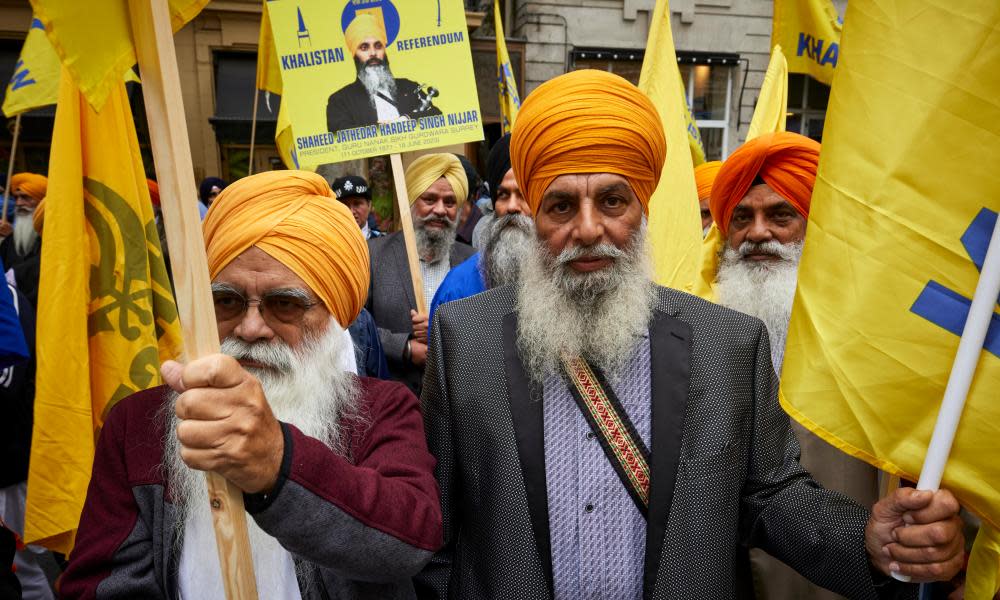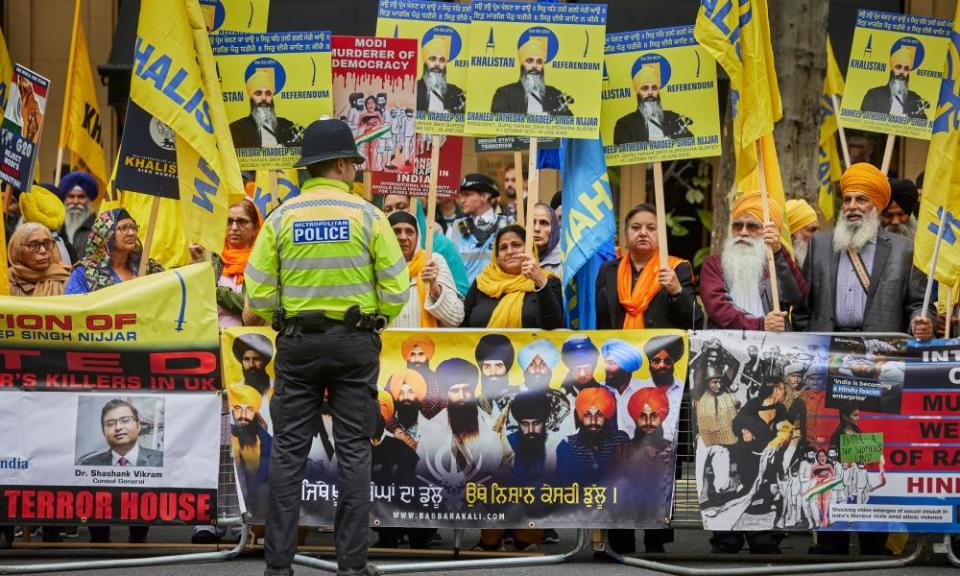Sikh separatists gather in London to protest after activists’ deaths

Supporters of the Sikh separatist Khalistan movement gathered outside the Indian high commission in central London to call for the UK government to stand alongside Canada after the killing of a prominent Sikh leader.
Monday’s protest on Aldwych came two weeks after Canada’s prime minister, Justin Trudeau, said his government was looking at “credible allegations potentially linking” India with the killing of Hardeep Singh Nijjar, in British Columbia. Nijjar, who was 45, was killed on 18 June in a hail of gunfire outside his place of worship.
“We stand shoulder to shoulder with the Canadian government that sacrificed a lot taking big risks. But there are major questions to ask of the UK government and its role,” said Dabinderjit Singh, principal adviser for the NGO Sikh Federation UK.
On Monday, the federation, in conjunction with the family of Avtar Singh Khanda, called for an inquest after the 35-year-old Sikh activist died in a Birmingham hospital after a short illness this summer. The official cause of death, which was declared postmortem, was acute myeloid leukaemia, a blood cancer.
“If Sikhs are being targeted in this country, it raises a question mark over the sovereignty of Britain as well,” he said. “We’re just completely silent. Can’t they simply stand with Canada?”
In the immediate aftermath of Nijjar’s death in June, the FBI warned at least three Americans active in the Sikh community that their lives were in danger. The federation has said it is concerned that British authorities have not given security advice to high-profile individuals or to gurdwaras, the Sikh places of worship. British Sikhs have been asked to write to their MPs to urge them to address security measures for the Sikh community, who number more than 500,000 in the UK.
On Friday, India’s high commissioner to the UK attempted to visit a gurdwara in Glasgow, which Indian officials said was disrupted by three protesters.

“I want the UK government to take this matter seriously and not prioritise their trade deals or agreement over the lives of British Sikhs living in the UK. The British Sikh community wants to know how they are protected, and what the government is doing for their safety,” said Sarabjit Singh Banur, a freelance journalist and former executive member of his local gurdwara who has lived in Britain for 25 years.
He has not returned to India since 2011 after being questioned by government officials for his journalism. Banur says in 2019 he was placed on a list compiled by India’s counter-terrorism National Investigation Agency (NIA). The homes of his family in Punjab have been raided several times, he said, and his image has been circulated on Indian media outlets labelling him a terrorist.

“It’s extremely worrying that as a British citizen, a British-Sikh journalist, I am targeted for speaking against oppression through my writing,” he said.
Banur has raised the matter with his local MP. However, he has since stopped doing community work for local cancer and domestic violence charities and avoids large crowds.
“We’re scared because we have children,” said Banur’s wife and former Slough councillor, Kamaljit Kaur. “We’re British citizens, we should be protected by the British government.”
Standing at the edge of the crowd at the Indian high commission, Sukhbir Singh said the the UK government appeared to be “losing its way” by aligning with India for geostrategic and economic gain.
“We have British citizens like myself who are entering into what looks like a tiered system of citizenship, where our rights are compromised, or are up for negotiation, in order to please a foreign government,” he said.

 Yahoo News
Yahoo News 
